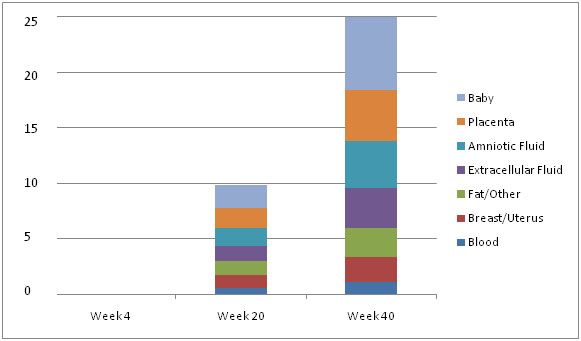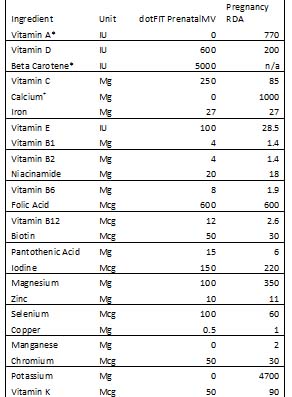
Women who are pregnant or who want to be have many questions about how to have a healthy baby, a healthy pregnancy, maintain some level of fitness and return to their pre-pregnancy weight as quickly as possible. The short answer for a normal-weight woman is to eat as perfectly as possible, gain between 25 and 35 pounds during pregnancy, exercise in moderation and you will likely be within a few pounds of your former weight in about 6 months.
Gaining the correct amount of weight is important as excesses in either direction may have detrimental effects for the baby and mother. A strong predictor of weight gain for the baby is the starting BMI (Body Mass Index – a measure of weight for a given height) of the mother and the amount of weight she gains. Weighing too little at the beginning of pregnancy for the mom can lead to growth slowing and an underweight baby. Slowed growth can be bad for the baby since it increases the risk for problems shortly after birth. Being underweight or gaining too little from inadequate nutrient intake also puts the mother at risk for larger than normal losses of mineral stores. Weight gained during pregnancy above recommendations is more likely to be retained weight after delivery. Too much weight gain for the mother increases the risk of gestational diabetes, high blood pressure and can indicate preeclampsia. It also increases the risk of either preterm delivery and low birth weight, or excessive weight gain for the baby. The table below shows the recommended amount of weight gain for a single pregnancy based on the starting BMI of the mother.
Recommended Pregnancy Weight Gain Based on Starting BM
Starting BMI Under 20 20 to 26 26.1 to 29 Above 29
Recommended Weight Gain 30 to 40 lbs 25 to 35 lbs 15 to 25 lbs Up to 15 lbs
Based on this chart a woman who is 5’4” tall weighing between 117 and 151 lbs should gain between 25 and 35 pounds during pregnancy for optimal health for her and her baby. The weight gain recommendation is to supply adequate energy and nutrients to support tissue growth in several areas and averages 300 calories daily. This energy cost is not even throughout the pregnancy. The beginning of pregnancy demands little to no additional energy, while the last half sees a large surge in energy needs. Figure 1 below shows an estimated breakdown of the components of a 25 pound weight gain during the pregnancy for a 7 pound baby.
Figure 1 Weight Gain in Pregnancy in pounds.

At week four there is not enough of a change to equal a pound so it appears as zero on the figure.
Nutrition
To support optimum weight gain during pregnancy, avoid alcohol, cigarettes, limit or avoid caffeine and exercise in moderation. Proper formation of the central nervous system, spine and skull occurs early in development and requires an ample supply of nutrients such as folic acid even before calorie needs begin to climb. Inadequate folic acid to the developing baby can lead to neural tube defects such as spina bifida and anencephaly. Calcium and iron intakes need to be increased in addition to many others. This can be a difficult time to eat properly for women with nausea, vomiting, heartburn and a limited stomach size.
The intake of alcohol should be avoided during pregnancy. There is a strong relationship between alcohol intake and abnormal baby development in women who drink alcohol during pregnancy. The severe form of this is called fetal alcohol syndrome, which is characterized by facial changes, small size for age and problems with the central nervous system including low IQ. The bottom line: there is no safe period during pregnancy to drink alcohol and no safe amount to drink.
Caffeine is safer than alcohol in small amounts. It is still important to limit caffeine to 300mg daily. Recent studies of caffeine use during pregnancy show an increased risk of a preterm delivery although there is no proof that caffeine causes it.
Not much needs to be said about tobacco during pregnancy. Cigarettes contain numerous harmful chemicals that reach the baby when a woman smokes. One of the better known compounds in tobacco is nicotine, which constricts blood vessels and limits the oxygen that reaches the baby. Don’t do it.
Exercise
Exercise during pregnancy is covered elsewhere on this website and will be briefly discussed here. In general exercise during pregnancy is healthy and can be beneficial for the mother and delivery. Ask your doctor before beginning any exercise program. Avoid exercises that make it easy to lose balance, contact sports, and large increases in volume or intensity to the workload. Start slowly, make gradual changes and pay attention to your body; when it is painful or difficult to continue, stop. Also, don’t do exercises on your back during the second and third trimesters. Click here to download a workout routine for pregnant women designed by the experts at NASM (National Academy of Sports Medicine).
Dietary Supplements
dotFIT recommends the use of a multivitamin formula for everyone, especially women of child bearing years. Iron and folic acid can be very difficult to consume in the quantities required by pregnancy, which is why the American College of Obstetricians and Gynecologists endorses the use of supplements to supply iron for pregnant women. Ask your doctor for instructions if you have been diagnosed with any blood disorder, have a history of birthing children with neural tube defects or take medicine for seizures. Otherwise, it is prudent to use the dotFIT PrenatalMV™ or a prescription prenatal multivitamin/mineral supplement for the duration of the pregnancy. This will augment your best attempts at eating a perfect diet. The table below shows the contents of the dotFIT PrenatalMV along with the RDA for pregnant women aged 18 to 50.
Table 2 Nutrient needs during pregnancy and the dotFIT PrenatalMV multivitamin.

* Beta carotene is converted to vitamin A in the body as needed. Large doses of vitamin A during pregnancy have negative effects, whereas beta carotene does not. dotFIT has chosen to use beta carotene for the vitamin A source in the prenatal.
+ Calcium was left out of this product to maximize iron absorption and minimize pill size. Adding 1000 mg of calcium to this formula would result in a pill too large for most women to swallow comfortably. Instead, the dotFIT SuperCalcium+™can be used to add calcium to any diet with inadequate intake.

Informative...Does excess weight gain during pregnancy affect child health?
ReplyDeletePregnancy Symptoms Week by Week